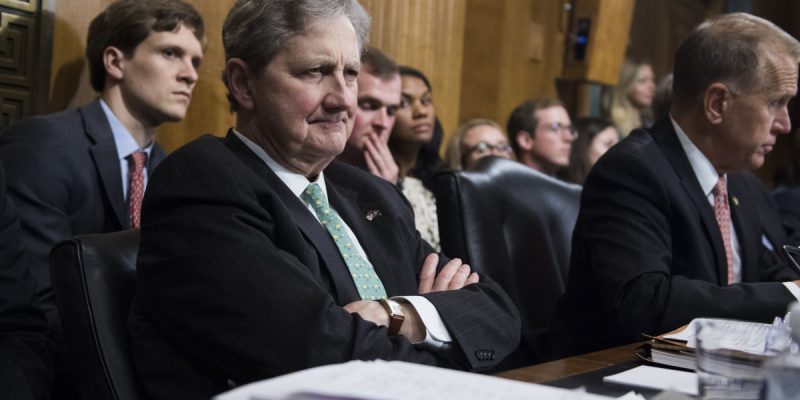The Council for a Better Louisiana’s head hit the nail on the head about why it’s unlikely there will be any televised candidate forum — often imprecisely called a “debate” — for this fall’s Louisiana Senate race. And it doesn’t matter.
CABL has tried to sponsor one — the way it works legally is some organization puts one together and then news outlets can “cover” it as a news event — with the three candidates likely to receive more than a couple percentage points of the vote: incumbent Republican Sen. John Kennedy, Democrat community organizer and past congressional candidate Gary Chambers, and Democrat pilot Luke Mixon. It even had a date set, Oct. 20.
However, it won’t happen because Kennedy’s campaign won’t commit exactly then. That’s completely understandable from a strategic standpoint. A heavy favorite in part because of high popular approval, someone in Kennedy’s position has everything to lose and nothing to gain by participation, while his opponents operate under the reverse dynamic. Even allowing them to appear on the same stage elevates their status comparatively, which an overwhelming favorite wouldn’t want to encourage.
Additionally, the dynamics themselves have changed in favor of the high-quality candidates. CABL Pres. Barry Erwin explained this exactly: “I think maybe a lot of that has to do with the rise in social media and the fact that candidates can get the word out in that type of setting that they have a lot more control over they do than in a live debate.” Especially this applies to Kennedy, who in his first term has become known in the media as eminently quotable that guarantees coverage helpful to boosting his approval that other candidates would sell their souls for — check out Chambers’, no stranger to being a media whore, disgruntled comments about that.
Erwin also opined he thought the exercise useful, but here he landed mostly off the mark. That might have been true even a decade ago, but this rise of social media and other forms of direct candidate communication to voters make the debate format largely superfluous, due to something political scientists discovered long ago – that campaign ads by themselves not only convey an adequate, both in breadth and comprehension, menu of a candidate’s issue preferences for the typical voter, but also these tend to do better on both accounts than news coverage, which typically is very superficial and looks more at how the contest is going, like a horse race, than the issues it’s about.
Advertisement
The debate format can produce some policy details, but its ability to do so largely depends upon the people running the operation – the organizers who determine the rules and subjects and who ends up moderating and questioning. Bias appears in a number of ways: the candidates to choose, their presentations, and the moderators/questioners involved, plus, can you really pick up any in-depth policy discussion in responses that last a minute? And, the reality is such forums make little difference because almost nobody watches them, because so much comprehensive information about candidates exists just a tap or click away, and a good chunk of those who do tune in are rabid supporters of a candidate looking to count coup on the opposition.
The only use the things have comes from two related matters: whether a candidate makes an awful gaffe, which is the only time these might have any significant impact on a campaign these days, or to satisfy the bromide that the public needs to see the candidates work “under pressure.” Yet does anybody seriously believe that governing extensively involves split-second decision-making under the lights devoid of context? That’s perhaps the worst basis on which to choose a leader.
No wonder the debate format is going rapidly out of style. It doesn’t make a unique contribution unless you root for candidate mistakes made in an entirely atypical governing environment – and even then, it may not make a difference in the outcome, if Americans deign to elect a self-proclaimed “gaffe machine” as president. Of course, the media and the interest groups like CABL who sponsor these will clamor for their retention as it empowers their role in the election process, but whether that happens the candidates, especially front-runners, will determine, and they increasingly don’t seem of a mind to cooperate.
Advertisement
Advertisement

